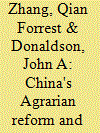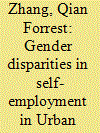|
|
|
Sort Order |
|
|
|
Items / Page
|
|
|
|
|
|
|
| Srl | Item |
| 1 |
ID:
151713


|
|
|
|
|
| Summary/Abstract |
As rural governments have become hollowed out and detached from rural society, can they still effectively implement policies that lack popular support? This article examines a county in Hunan Province, where local governments had strong incentives to implement a national policy of increasing double cropping in rice farming. Small farmers rejected double cropping as unprofitable. Local governments’ limited capacity prevented them from either reshaping small farmers’ economic calculus or coercing compliance. They strategically selected a policy tool acceptable to most small farmers (paid land transfers) and gave new private large-scale producers incentives to double crop by providing subsidies and access to large tracts of farmland. The local governments now rely on large-scale producers as their agents for policy implementation and agricultural governance. This and the collusive relationship that has formed between the two are pushing small farmers out of agriculture.
|
|
|
|
|
|
|
|
|
|
|
|
|
|
|
|
| 2 |
ID:
123963


|
|
|
|
|
| Publication |
2013.
|
| Summary/Abstract |
Many reporters and scholars outside China advocate the privatization of land ownership in China as a necessary step for the transformation of China's agriculture system into a modern, large-scale, market-oriented and technology-intensive one. Chinese scholars advocating land privatization, for their part, typically argue that land privatization would better protect farmers' rights and interests. We present a contrarian view to these calls for land privatization. Under China's current system of collective land ownership and individualized land use rights, agriculture has modernized rapidly in China in a way that has avoided privatization's many downsides. Land privatization, by contrast, would only exacerbate class inequality and social tension in rural China and further weaken farmers' positions in dealing with more powerful actors. Through analyzing six dimensions of this issue-increasing investment in land and agricultural productivity, promoting scaled-up modern agriculture, protecting farmers' land rights and preventing land grabs, enhancing rural livelihoods, and facilitating rural migrants' integration into cities-we maintain that strengthening the current system is superior to privatizing rural land.
|
|
|
|
|
|
|
|
|
|
|
|
|
|
|
|
| 3 |
ID:
153537


|
|
|
|
|
| Summary/Abstract |
Since the 1990s, agricultural cooperatives—particularly what China calls Farmers’ Specialized Cooperatives—have experienced rapid expansion in China. After more than two decades of growth and policy support, what is the overall performance of the ever-increasing numbers of these cooperatives? We visited 50 cooperatives across the country, most of which had officially been lauded as successful, to make a first-hand evaluation of their overall status and performance. We argue that, judging by either international or Chinese standards, the vast majority of these agricultural cooperatives are not authentic and fail to deliver expected benefits to smallholders. We categorize them into five types: genuine cooperatives, shell cooperatives, de facto private agribusinesses, decooperativized cooperatives, and failed cooperatives. Four barriers impede the long-term prospects of authentic cooperatives: social differentiation, lack of trust, unpredictable markets, and poor policy design and implementation.
|
|
|
|
|
|
|
|
|
|
|
|
|
|
|
|
| 4 |
ID:
124651


|
|
|
|
|
| Publication |
2013.
|
| Summary/Abstract |
This article presents the first quantitative analysis of gender disparities in self-employment in urban China. It documents the extent of gender income inequality in self-employment. By disaggregating self-employment into three occupational classes, it reveals the gender segregation within self-employment - women were concentrated in the financially least rewarding segment - and identifies it as a main source of gender income inequality. I examine a range of determinants of participation in self-employment, including family structure, family background and career history, and how their gender-specific effects contribute to gender segregation. Although using data from a 1996 national survey, this study captures two key processes that shaped the structure of self-employment in contemporary urban China: the restructuring of the state sector and the growth of financial returns and social status in the private sector, both of which contributed to the formation of gender segregation in self-employment.
|
|
|
|
|
|
|
|
|
|
|
|
|
|
|
|
| 5 |
ID:
092686


|
|
|
|
|
|
|
|